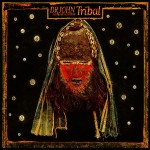 Dr. John is among the core group of New Orleans musicians who’ve brought renewed purpose to their work in the last five years. His last release, City That Care Forgot, was a masterpiece of post-Katrina commentary. Tribal is more personal, with a spectacular performance from his “Lower 911” band, particularly from drummer Herman Ernest III, who co-produced the album, and guitarist John Fohl.
Dr. John is among the core group of New Orleans musicians who’ve brought renewed purpose to their work in the last five years. His last release, City That Care Forgot, was a masterpiece of post-Katrina commentary. Tribal is more personal, with a spectacular performance from his “Lower 911” band, particularly from drummer Herman Ernest III, who co-produced the album, and guitarist John Fohl.
Of all his myriad talents, perhaps the most overlooked aspect of Dr. John’s genius is the quality and depth of his songwriting. His offhanded, conversational delivery makes it all sound deceptively simple, like the outfielder whose seemingly effortless speed allows him to appear nonchalant on his way to difficult catches. But few writers of his generation have produced as wide a catalog of songs for varied occasions, from his voodoo-based constructions to R&B classics, love ballads, observations of various “char-actors” he’s known and anger-fueled protest material. Lyrically, Mac Rebennack can be by turns the surliest of cynics and the most clear-eyed of idealists, and in every case he writes the perfect music to accompany those feelings.
Tribal is a characteristically strong collection of songs that are easily seen as a pair of EPs, one about Rebennack’s worldview and the other about personal relationships. The album title provides the theme for the worldview material, tying together a lot of ideas that have populated his work over the years—the importance of Nature and the pre-Columbian animus of the spirit world as an antidote to the evils of contemporary society (“The tribal plan is for every man”); the connection between that world and the African-American spirit world, explicitly drawn in the title track, which opens with a Native American drum circle that brilliantly morphs into Mardi Gras Indian drumming; and the power of music to transform negativity into celebration and spiritual transcendence. In Dr. John’s world, music is always a healing force, an idea forcefully demonstrated in the album’s opening track, “Feel Good Music.”
“I’ve got a song,” he promises. “I got the cure in the palm of my hand.”
The animistic element of his vision comes to the fore next in “Lissen at Our Prayer,” which counsels the listener to pay attention to Mother Earth, the Great Spirit and “the critters” as well as “your own self.”
The record comes back down to earth for “Big Gap,” an overtly political tune with a carefree lilt that gives the refrain, “There’s a mighty big gap between rich and poor / The rich are rich but the poor have more,” the merry feel of a nursery rhyme, a sense underscored by the sprightly horn chart.
The album shifts gears for “Change of Heart,” the first of several songs about a relationship that’s fallen apart. Dr. John can make the bummer of getting dumped by your lover sound like fun, and he takes things a step further on “When I’m Right (I’m Wrong),” coining the memorable phrase, “When I’m right I’m wrong / When I’m wrong I’m wrong.” The climax of this song cycle is “Manoovas,” a great put-down of his ex. “Don’t use your manoovas on me,” he sings accusingly as guest guitarist Derek Trucks spins a nasty slide guitar riff that adds a stinging exclamation to Rebennack’s declamation. Trucks fits well with Fohl, a great guitarist who can play invisibly inside a piece or take it over with a bold flourish as the occasion warrants. He turns in his best performance on Tribal, using an inventive figure to propel the uplifting “Music Came” and turning the hard funk of “Potnah” inside out with outstanding support lines.
“Potnah” concludes Tribal’s political commentary, and it fits into Rebennack’s career-long history of writing tough songs about shady characters. When he sings, “Your runnin’ potnah/be the one that swung ya,” it sounds a lot like his accusations of political betrayal on City That Care Forgot.
Dr. John’s capacity for optimism following his dire observations about bad politics and relationships is inspirational. He ends Tribal with a flourish worthy of Flannery O’Connor on “A Place in the Sun.” At an age (69) when most people are contemplating their past, he’s still planning his future. “Gonna reach for the top before I die,” he promises. “I’m a seeker of the truth…Gonna find a little place in the sun.“ This flourish of goodwill is in fact a summation of Mac’s worldview, that faith in the world of the spirit mediated to what he calls “the meat world” through music can redeem us all.



